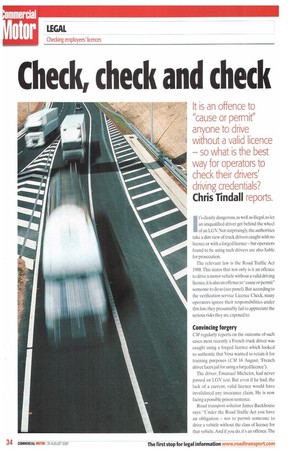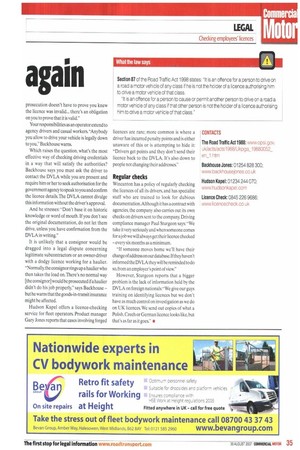Check, check and check again
Page 34

Page 35

If you've noticed an error in this article please click here to report it so we can fix it.
11
It is an offence to cause or permit" anyone to drive without a valid licence — so what is the best way for operators to check their drivers' driving credentials?
Chris Tindall reports.
It's clearly dangerous, as well as illegal, to let an unqualified driver get behind the wheel of an LGV. Not surprisingly, the authorities take a dim view of truck drivers caught with no licence or with a forged licence — but operators found to be using such drivers are also liable for prosecution.
The relevant law is the Road Traffic Act 1988. This states that not only is it an offence to drive a motor vehicle without a valid driving licence, it is also an offence to "cause or permit" someone to do so (see panel). But according to the verification service Licence Check, many operators ignore their responsibilities under this law; they presumably fail to appreciate the serious risks they are exposed to.
Convincing forgery CM regularly reports on the outcome of such cases: most recently a French truck driver was caught using a forged licence which looked so authentic that Vosa wanted to retain it for training purposes (CM 16 August. 'French driver faces jail for using a forged licence').
The driver, Emanuel Michelot, had never passed an LGV test. But even if he had, the lack of a current, valid licence would have invalidated any insurance claim. He is now facing a possible prison sentence.
Road transport solicitor James Backhouse says: "Under the Road Traffic Act you have an obligation — not to permit someone to drive a vehicle without the class of licence for that vehicle. And if you do, it's an offence.'The prosecution doesn't have to prove you knew the licence was invalid.., there's an obligation on you to prove that it is valid."
Your responsibilities as an operator extend to agency drivers and casual workers. "Anybody you allow to drive your vehicle is legally down to you," Backhouse warns.
Which raises the question, what's the most effective way of checking driving credentials in a way that will satisfy the authorities? Backhouse says you must ask the driver to contact the DVLA while you are present and require him or her to seek authorisation for the government agency to speak to you and confirm the licence details. The DVLA cannot divulge this information without the driver's approval.
And he stresses: "Don't base it on historic knowledge or word of mouth. If you don't see the original documentation, do not let them drive, unless you have confirmation from the DVLA in writing."
It is unlikely that a consignor would be dragged into a legal dispute concerning legitimate subcontractors or an owner-driver with a dodgy licence working for a haulier. "Normally, the consignor rings up a haulier who then takes the load on. There's no normal way [the consignor] would be prosecuted if a haulier didn't do his job properly," says Backhouse but he warns that the goods-in-transit insurance might be affected.
Hudson Kapel offers a licence-checking service for fleet operators. Product manager Gary Jones reports that cases involving forged licences are rare; more common is where a driver has incurred penalty points and is either unaware of this or is attempting to hide it: "Drivers get points and they don't send their licence back to the DVLA. It's also down to people not changing their addresses."
Regular checks Wincanton has a policy of regularly checking the licences of all its drivers, and has specialist staff who are trained to look for dubious documentation.Although it has a contract with agencies, the company also carries out its own checks on drivers sent to the company. Driving compliance manager Paul Sturgeon says: "We take it very seriously and when someone comes for a job we will always get their licence checked every six months as a minimum.
"If someone moves home we'll have their change of address on our database. If they haven't informed the DVLA they will be reminded to do so,from an employer's point of view."
However, Sturgeon reports that a bigger problem is the lack of information held by the DVLA on foreign nationals: "We give our guys training on identifying licences but we don't have as much control on investigation as we do on UK licences. We send out copies of what a Polish, Czech or German licence looks like, but that's as far as it goes.•






















































































































































































